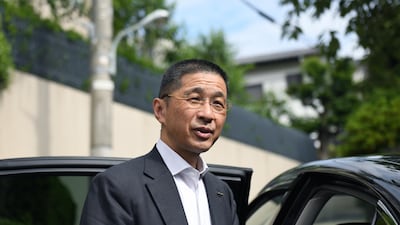Nissan Motors chief executive Hiroto Saikawa is due to be questioned by the board on Monday about allegations by a former senior executive that he broke company rules to pay for a house in Tokyo, according to Bloomberg sources.
Mr Saikawa will be asked at the meeting whether date restrictions on selling compensation-linked stock were altered in 2013, earning him a higher profit and facilitating payments for the property, said the sources. The executive will also be questioned about whether he asked the Japanese car maker to buy the house, and be repaid later in installments, they said.
The possible misconduct was alleged by Greg Kelly in an interview published earlier in June in monthly magazine Bungei Shunju. Mr Kelly was arrested on the same day in November as former Nissan Chairman Carlos Ghosn. Saikawa has denied using company funds to buy his house, saying he bought it with his own money. He has also so far refused to discuss the transaction with the Nissan board, the people said.
A representative of Nissan declined to comment.
The board’s questions to Mr Saikawa - Mr Ghosn’s former protege-turned-accuser - would come a day before he faces shareholders on Tuesday at the company’s annual meeting, where he may also be asked about the home. Mr Ghosn has been charged by Japanese authorities for financial crimes, which he has denied.
Mr Saikawa’s leadership has come under question since Mr Ghosn was arrested, though he has since been recommended to continue to serve as chief executive by Nissan’s governance panel. Mr Saikawa initially voiced his intention to step down once Nissan’s governance was improved, but he later backtracked, saying he would continue to serve as a way to take responsibility for a lack of oversight over Mr Ghosn.
The Japanese executive has come under more pressure as relations deteriorate with partner Renault, which owns 43 per cent of Nissan. Tensions broke out into the open after Mr Ghosn was arrested, and have worsened in recent months when Renault’s new chairman, Jean-Dominique Senard, pressed Nissan for a merger it didn’t want, then pursued a deal with rival Fiat Chrysler Automobiles without telling the Japanese company.
Mr Saikawa started at Nissan after graduating from the University of Tokyo in 1977. Much of his career was spent in the purchasing department, a critical function in any company but especially so for an auto maker, since procurement can account for as much as two-thirds of the cost of sales. He’s married and lives in central Tokyo, but like most Japanese executives, is discreet about his private life.

